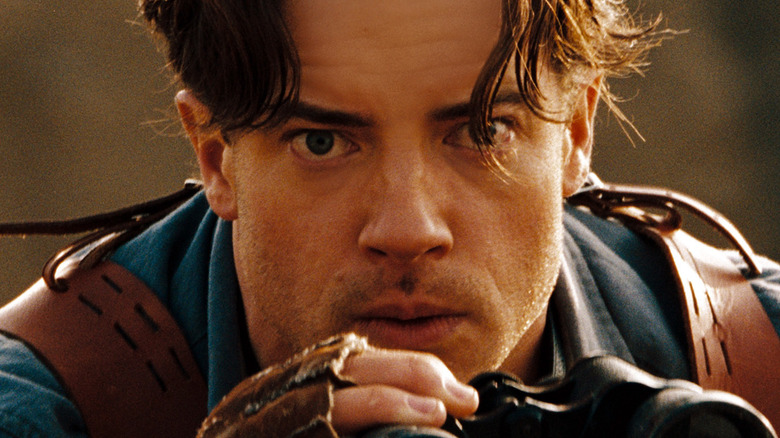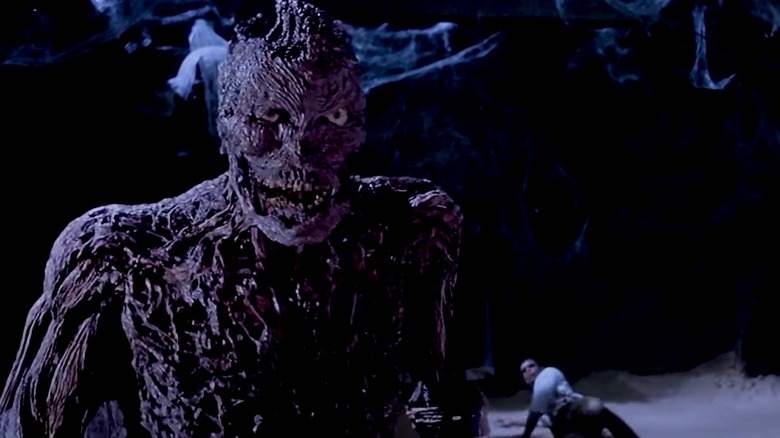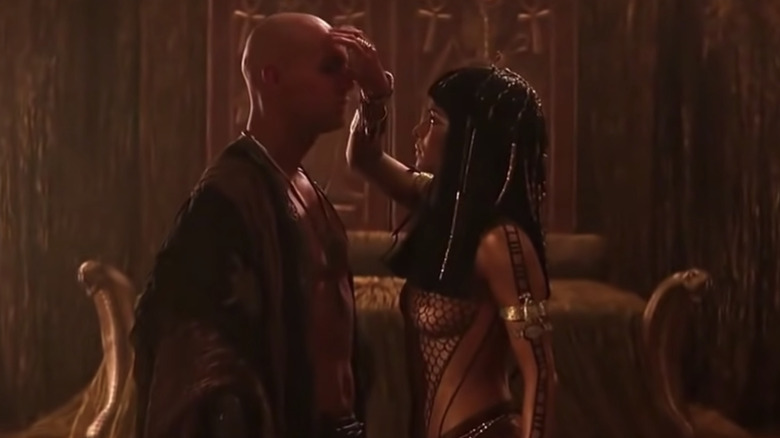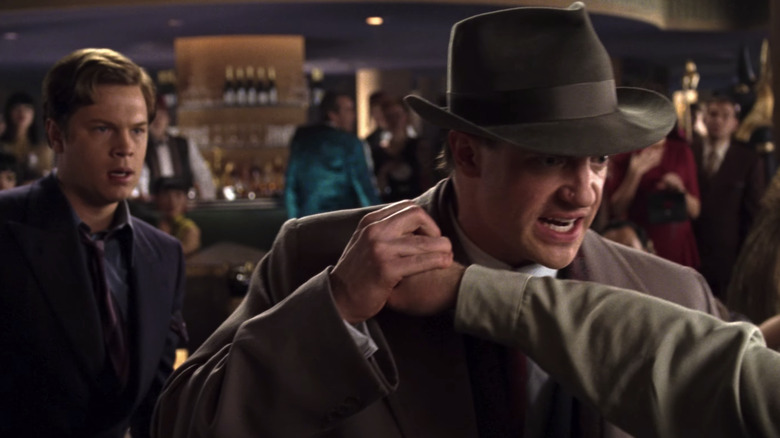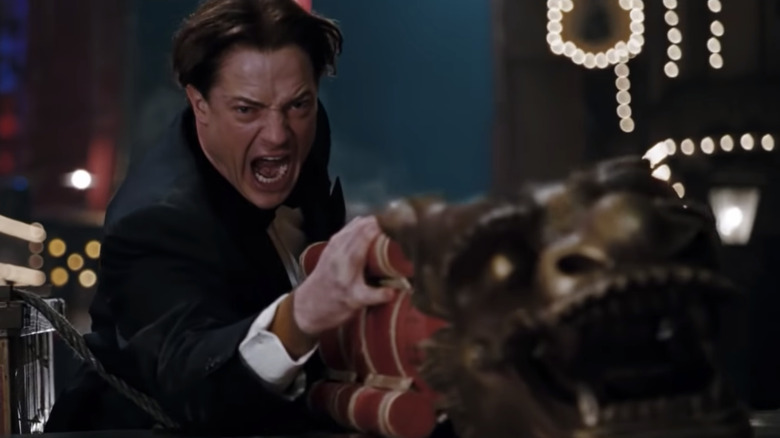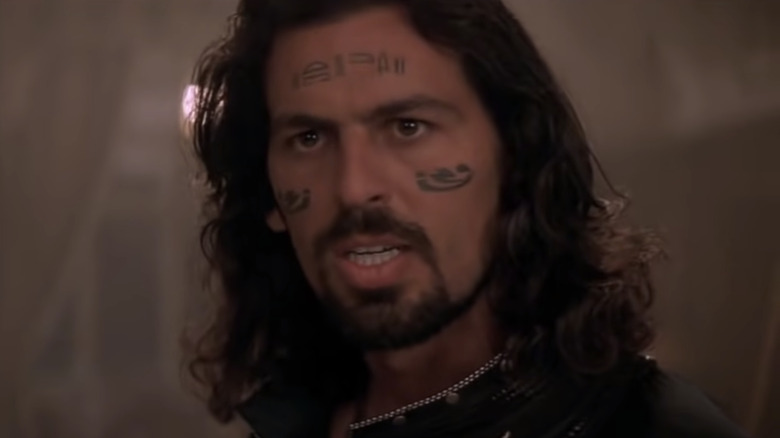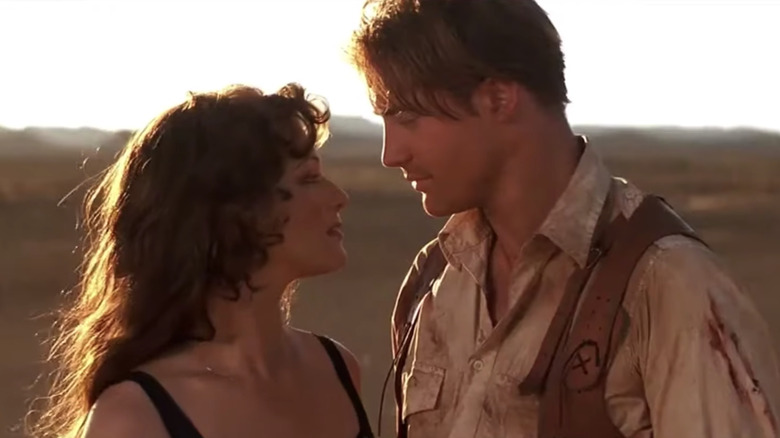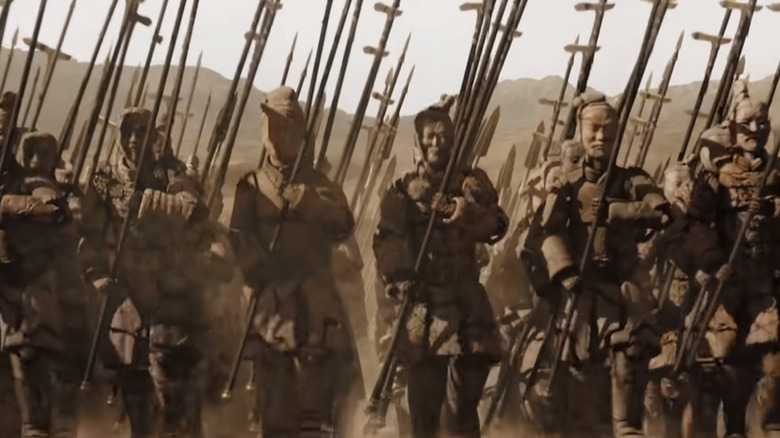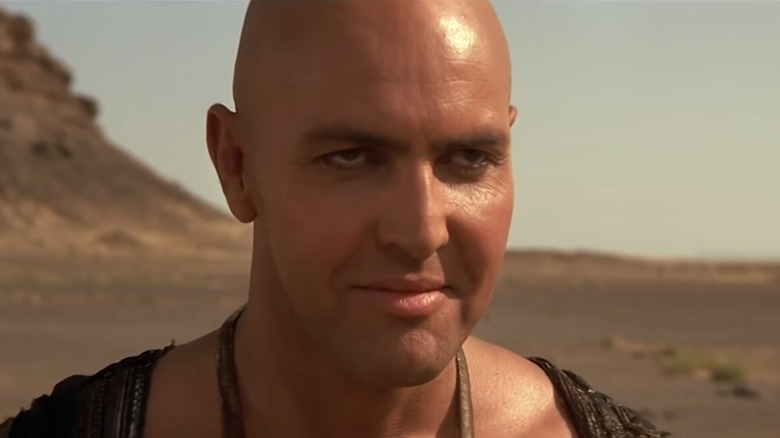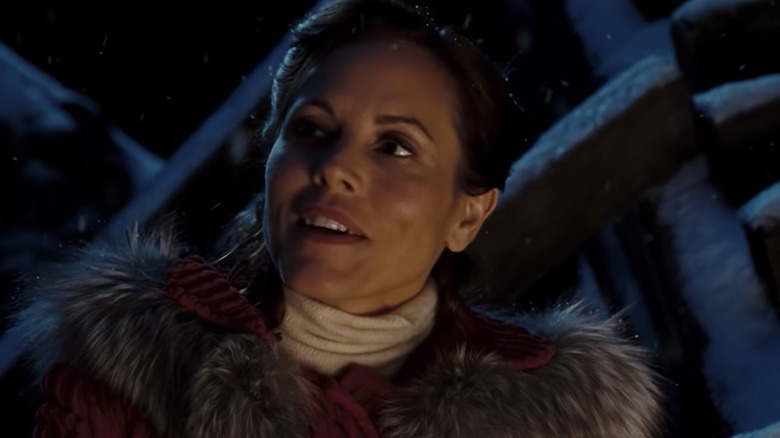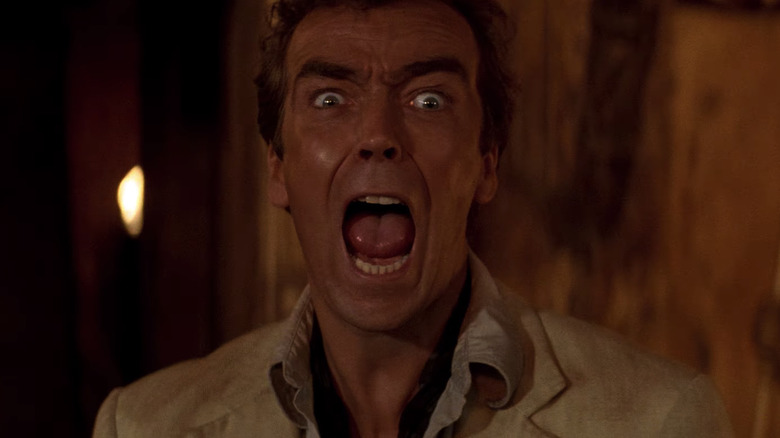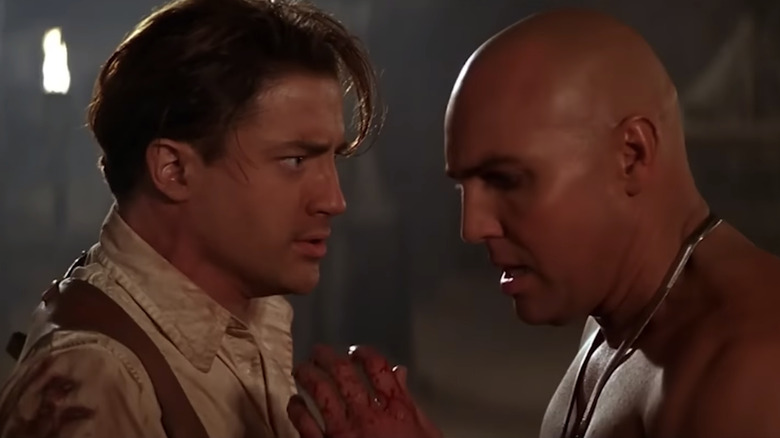The Mummy: Things That Happen In Every One Of The Brendan Fraser-Led Films
One of the most famous monsters in film history, the Mummy has consistently reared its ugly head on the big screen beginning in 1932 with Universal Pictures' original classic "The Mummy." Since then, the undead villain has refused to remain in the grave — or rather, the sarcophagus — and has continues to return from the underworld. The most triumphant of these returns, though, comes from Stephen Sommers' 1999 feature film "The Mummy," which rebooted the horror classic as a swashbuckling adventure. Starring Brendan Fraser, " The Mummy" trilogy that followed has become a favorite all over the world, with many hoping for an eventual return to this version of the horror story.
Alongside Fraser stood Rachel Weisz, John Hannah, and Arnold Vosloo, among others, who would help breath new life and excitement into the formerly rotten "Mummy" name. In fact, the success of Sommers' first two "Mummy" films lead to "The Scorpion King" spin-off, which first starred The Rock as the titular warrior, and the Hugh Jackman-led "Van Helsing," which reunited the classic Universal monsters such as Count Dracula, Frankenstein's monster, and the Wolf-Man against the famed monster hunter.
While "The Scorpion King" and "Van Helsing" became cult-classics in their own rights, with the former sparking four more sequels, none were as popular or as iconic as "The Mummy" trilogy. With three different mummy encounters, though, there were bound to be a few recurring threads. Here are the things that happen in every Brendan Fraser "Mummy" movie.
An evil mummy is reborn through supernatural means
Naturally, the title every "Mummy" movie implies that a mummy will rise from the dead to haunt and possibly attempt to take over the world, so if "The Mummy" trilogy did anything else we'd probably be disappointed. Unfortunately, none of these mummies are particularly friendly, and through some evil sorcery, they're always resurrected and reborn into the modern world, or in the case of these films the 20th century.
In "The Mummy," Evy Carnahan reads out-loud from the Book of the Dead, which already seems like a no-go to anyone who would think about that for more than a few moments. In doing so, she resurrects Arnold Vosloo's Imhotep, who slowly brings back the biblical 10 plagues of Egypt from the Book of Exodus. Likewise, Imhotep is resurrected once more in "The Mummy Returns" by cultists who took the Book of the Dead, only to turn around and bring back the evil Scorpion King from the underworld as well.
In the third installment, "Tomb of the Dragon Emperor," a mystical amulet called the Eye of Shangri-La is used to bring back Han the Dragon Emperor — played by Jet Li — who has full control of the Chinese elements. If anything about "The Mummy" movies is clear, it's that there has to be some sort of Mummy resurrection through supernatural means, it's kind of in the name.
Flashbacks to ancient history
In the case of all three "Mummy" films, they all open with a flashback to an ancient civilization and an origin story for the latest undead antagonist. In "The Mummy," we travel back to ancient Egypt and learn of the love story between the high priest Imhotep and Pharaoh's mistress Anck-Su-Namun, which naturally results in their deaths. The opening of "The Mummy Returns" chronicles the mythic origins of the Scorpion King, and "Tomb of the Dragon Emperor" tells the story of the Dragon Emperor and his downfall.
These glimpses back in time always prove vital to the plot of each "Mummy" film and give us the context we need as Rick O'Connell and his family fight to defeat the latest undead warlord. Not only do these films do a great job of recreating ancient time periods, but they usually add a supernatural flare to spice them up. The set pieces and mise-en-scène alone are noteworthy and impressive, so it's no wonder the Universal Studios theme parks developed their own ride based off the film series, complete with Egyptian-themed set-dressing.
In order to get the full story, "The Mummy" movies have no choice but to open with a flashback to an unknown time. Knowledge is power, and knowing where — or rather, when — our supernatural adversaries came from will better equip our heroes to send them back to the grave.
A new decade explored
One of the most exciting changes that Stephen Sommers' "The Mummy" made to the story was setting it back in the distant past of, well, 100 years ago. That's right, the 1999 "Mummy" is set during the Roaring '20s at the height of Egyptian archaeology, which means that it's an odd transitional period between the known and unknown reaches of history. Likewise, the second and third film hop across time-periods as well, with "Returns" taking place in the '30s and "Tomb of the Dragon Emperor" set in the mid-1940s.
Setting each film in a new decade — not too dissimilar to the way "Indiana Jones" does things — gives each "The Mummy" series installment a fresh feel and even more history to pull from, creating countless opportunities for action, adventure, and comedy. Since the third "Mummy" feature is set after World War II, the aftermath of the global conflict becomes the backdrop for the O'Connell's mission to stop yet another world war.
Of course, aside from the flashbacks to the ancient world, the films taking place in different time periods isn't exactly paramount to their success, but it is a fun thing that "The Mummy" movies do to set the stage and further remove us from our present reality.
Globe-trotting adventures
One thing that sets the Brendan Fraser "Mummy" movies apart from all other adaptations — save maybe the one that starred Tom Cruise — is their ability to take the story all the way around the world. While many of the original "Mummy" features — be it those produced by Universal or Hammer — stuck around in the same locale for the majority of their runtime, these "Mummy" movies pique our interest by taking us on a globe-trotting adventure. Again, seemingly inspired by "Indiana Jones," Rick O'Connell and his team know how to make the most out of their adventures.
Admittedly, the first "Mummy" flick takes place entirely in Egypt, with Rick, Evy, and the gang traveling from Cairo to the ruins of Hamunaptra. Though we don't travel to any other country in this movie, Rick O'Connell is an American mercenary, and Evy and Jonathan Carnahan are both from England. Many other members of the supporting cast hail from other countries as well, proving that — at least, for the characters — they all traveled far to get there.
However, both "The Mummy Returns" and "The Mummy: Tomb of the Dragon Emperor" take the O'Connell clan on a some wild goose chases from their home in London all the way to parts of Egypt, China, and the mythical Shangri-La. With different landscapes, cities, and magical places to explore, the "Mummy" movies certainly know how to keep us interested.
Mystic allies
Throughout the O'Connell's travels, they've encountered some important allies, many of which have magical ties of their own. In the first "Mummy" picture, the Medjai named Ardeth Bay is initially opposed to Rick, Evy, and the group as it is his sworn duty to keep Imhotep from rising again. By "Returns," Ardeth becomes a close friend, and it's revealed that Rick himself has ancient connections to the Medjai. Though his ties to the secret society wouldn't be explored any further in the films, the out-of-continuity animated series "The Mummy: Secrets of the Medjai" would explore Rick's role further.
In "The Mummy: Tomb of the Dragon Emperor," the O'Connells meet the mother of Alex's love-interest Lin, an immortal sorceress named Zi Yuan who has an incredible healing factor, telekinetic powers, and can even curse and resurrect the dead. Thankfully, Zi Yuan is on the O'Connell's side, and proves invaluable to defeating Han the Dragon Emperor's Terracotta Army. Without her, the world might've been lost. Oh, and let's not forget to mention the Yeti in the Himalayas and the undead army led by General Ming who helped too!
It's no secret that the O'Connell family has a long list of undead enemies, but they've made some helpful allies along the way too. If only all of their allies had the same incredible powers as their undead foes.
Adventurous love stories
As much as "The Mummy" movies are swashbuckling adventures with plenty of action and comedy, they're also epic love stories. Most importantly, "The Mummy" movies tell the story of Rick and Evelyn O'Connell (née Carnahan) as they went from professional rivals to working together to eventually falling in love. Like some of the most famous adventurers before them, they did this all while fighting an undead mummy.
By the time we catch up with them again in "Returns," they've even had a son named Alex, who is just as curious as his mother and as bold and brash as his father. Over a decade later, in "Tomb of the Dragon Emperor," Alex embarks on his own epic adventure, complete with a love story of his own. As Alex and Lin quickly fall in love, their story mimics his own parents, complete with Alex helping his father kill another Mummy before the world comes to an end.
Of course, the O'Connells don't have a monopoly on love; in the first two "Mummy" movies, Imhotep's entire motivation is the resurrection of his dead lover Anck-Su-Namun. Though this ends in heartbreak, both in the past and the film's present, it's a tragic love story worthy of the name.
Large undead supernatural armies
A trope in modern blockbusters is the idea that a large army of either robots, aliens, or other sci-fi/fantasy creatures is sent by the antagonist to destroy the home of the protagonist or the world. Big-budget franchises such as "Independence Day," "Star Wars," "Transformers," and "The Avengers" all come to mind here, and by the end of these movies the hero takes out the villain, which also somehow disables or destroys the enormous army headed their way. Well, "The Mummy" holds to this trope too, but when this franchise does it, it makes a little more sense.
The undead armies raised by Imhotep and the Dragon Emperor in their respective outings magically perish when the titular mummy is defeated, but there's a clear reason for that. Since the fate of their armies is tied supernaturally to their own resurrections, these armies only thrive if their masters do. In every "Mummy" outing, the mummy at hand uses their power to raise up their undead servants, whether it's the mummified priests they were buried with, the army of Anubis, or the Terracotta Army that was cursed by their own hubris. In the third one, there's even a good undead army!
These supernatural armies feel nearly unbeatable, but "if you cut the head off the snake," their armies will fall too. Though these undead warriors might feel cliché at this point, they tend to raise the stakes and make stopping the latest resurrected mummy paramount for humanity's survival.
Imhotep
Possibly the most iconic character in "The Mummy" series, the Egyptian high priest Imhotep is the original mummy through and through. Even the original 1932 "Mummy" movie featured Boris Karloff as Imhotep, a terrifying creature who rises from the dead to find his lost bride. Of course, the 1999 reboot featured Arnold Vosloo as the famed mummy, and his name has been synonymous with the name Imhotep ever since.
The main antagonist of the first two films, Imhotep just can't stay dead. Originally returning from the grave to be reunited with his dead lover Anck-Su-Namun, Imhotep is an immensely powerful sorcerer who manages to not only restore his lover in the sequel, but bring about the 10 plagues of Egypt on his enemies, reanimated his undead army, and eventually open a portal to the underworld where he brought forth the Scorpion King. Even though he meets his final demise at the end of "The Mummy Returns," Imhotep's legacy lives on.
In "Tomb of the Dragon Emperor," Jonathan opens up his own Egyptian-themed nightclub in Shanghai which he called "Imhoteps," and it isn't long into the film before it's mentioned that Rick killed the same Mummy twice. Whether Arnold Vosloo shows up as the titular mummy or not, there's no doubt that Imhotep makes himself known in all three films.
Recasting lead characters and swapping crew members
A bad practice among the Brendan Fraser-led "Mummy" movies is that they often re-cast important lead characters and replaced vital members of the crew. The biggest offender of this: "The Mummy: Tomb of the Dragon Emperor." While the film brings back Fraser as our hero Rick O'Connell, it replaces Rachel Weisz with Maria Bello in the role of Evelyn "Evy" O'Connell. While Bello isn't bad by any stretch, and she was originally signed on for a fourth "Mummy" film before it was scrapped for the 2017 Tom Cruise reboot, the character wasn't the same when not played by Weisz. Likewise, the role of Alex O'Connell, formerly played by child actor Freddie Boath, was played Luke Ford in the third "Mummy." Admittedly, this change made a bit more sense given the 13-year difference between the films, but for some it was unwarranted.
Cast members weren't the only folks in "The Mummy" franchise who were replaced. The story for the first film was broke by writer/director Stephen Sommers along with Lloyd Fonvielle and Kevin Jarre, who are both credited with creating these iconic characters. While Sommers would return in some capacity for the sequels, Fonvielle and Jarre did not.But Sommers would be replaced too, and "Tomb of the Dragon Emperor" — which was still produced by Sommers — was ultimately directed by Rob Cohen of "The Fast & The Furious" fame, with a screenplay written by "Smallville" creators Al Gough and Miles Miller.
John Hannah as Jonathan Carnahan
Besides Brendan Fraser himself, the most recurring actor in "The Mummy" series is John Hannah, who played Evy's brother and Alex's uncle Jonathan Carnahan. Known for his consistent inability to hold a steady job and his on-and-off gambling debts, Jonathan has managed to help Rick and the O'Connell's save the world on more than one occasion — and always seems to make a profit in the process.
Whether he's working as a thief or a nightclub owner, Jonathan always manages to be in the right place at the right time — at least when he isn't in the wrong place at the wrong time. His discovery of the mystical golden scepter in "The Mummy Returns" proves paramount to the defeat of the Scorpion King and the Army of Anubis, and his theft of the map to Hamunaptra is the only reason Rick and Evy meet in the first place.
Sure, Jonathan Carnahan might not be the most trustworthy or stand-up guy, but he has heart where it counts, and is willing to do anything to protect his family — and in the end, that's all that really matters anyway.
Rick O'Connell defeats the mummy
Probably the most reliable part about "The Mummy" movies is that Rick O'Connell is bound to defeat a mummy at some point. Whether it's an ancient soldier resurrected by the big bad or the titular mummy himself, Rick is known for being bad news for the undead. By the third film, Evy has written adventure novels based on their family's own mummy-fueled adventures, with Rick being her hero as always. Of course, he never does it alone, but Rick always delivers the final blow.
Though he's something of an amateur mummy hunter in the first movie, by the time the third "Mummy" movie comes around, Rick is an expert mummy killer. Over the course of three distinct decades, Rick has defeated three unique undead and mystical foes and even the same mummy twice. If that doesn't make him an expert monster hunter, then nothing will. It's a shame we'll never see Brendan Fraser's Rick O'Connell team-up with Hugh Jackman's Van Helsing because they'd be quite the Stephen Sommers-made team.
Rick may not be the brains of the operation — that honor belongs to Evy — but he's certainly the brawn. The O'Connell patriarch can take a beating for sure, but he can also give one. If there's anyone you should want at your side when battling the forces of the undead, it would be Rick O'Connell, hands down.
